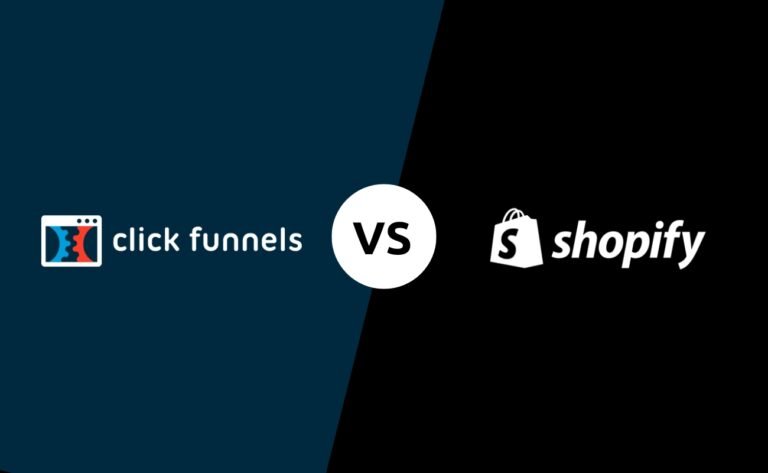Introduction: Why the Right Platform Matters
Starting and scaling an online business isn’t just about having great products or services it’s also about choosing the right platform to sell them. Two names that dominate conversations in this space are ClickFunnels vs Shopify.
Both platforms are designed to help entrepreneurs grow online, but they cater to different needs. Shopify shines as a complete eCommerce solution, while ClickFunnels specializes in sales funnels and conversions.
So, how do you decide which is better for your business? This in-depth guide compares their features, pricing, pros and cons, and real-world examples to help you make an informed decision.
ClickFunnels Overview: Sales Funnel Powerhouse
Key Features
-
Drag-and-Drop Funnel Builder – Build sales funnels, landing pages, and checkout flows without coding.
-
Built-in Email Marketing – Send automated follow-ups and nurture leads effectively.
-
A/B Testing – Compare versions of your pages to find what converts best.
-
Pre-Designed Templates – Choose from industry-specific funnel designs to save time.
-
Analytics Dashboard – Real-time insights into funnel performance and conversion rates.
Benefits for Entrepreneurs
ClickFunnels is designed for marketers and business owners who prioritize conversions over traditional eCommerce setups. Whether launching a digital product, hosting webinars, or running lead-generation campaigns, ClickFunnels provides the tools to turn visitors into paying customers.
Best Use Cases
-
Selling digital products, courses, or memberships
-
Running webinars and online coaching programs
-
Businesses focused on lead generation and upsells
Shopify Overview: The eCommerce Leader
Key Features
-
Easy Store Setup – User-friendly interface for launching a professional online store.
-
Theme Library – 100+ customizable templates for different industries.
-
Secure Payments – Shopify Payments + multiple gateways (PayPal, Stripe, Apple Pay, etc.).
-
Inventory & Order Management – Track stock levels, fulfill orders, and automate updates.
-
Marketing Tools – Built-in SEO, discount codes, email campaigns, and integrations with social media.
Benefits for Store Owners
Shopify is built for selling physical or digital products at scale. From small startups to global brands, it provides reliability, scalability, and a strong ecosystem of apps to enhance store functionality.
Best Use Cases
-
Retail brands and product-based businesses
-
Dropshipping and print-on-demand stores
-
Entrepreneurs who want a long-term eCommerce hub
ClickFunnels vs Shopify: Feature-by-Feature Comparison
1. Pricing & Plans
-
ClickFunnels starts around $127/month, with advanced plans offering affiliate management and automation.
-
Shopify starts at $39/month, scaling up to $399/month for advanced analytics and reporting.
If your goal is conversion-focused marketing, ClickFunnels may justify the higher price. For product-heavy businesses, Shopify offers better value.
2. Ease of Use
-
ClickFunnels: Great for funnel building, but beginners may face a marketing learning curve.
-
Shopify: Straightforward store setup; minimal technical knowledge needed.
3. Customization & Design
-
ClickFunnels: Flexible funnel customization with drag-and-drop, but limited in storefront design.
-
Shopify: Extensive themes, apps, and design options for a polished online store.
4. Marketing Tools & Integrations
-
ClickFunnels: Best for sales funnels, upsells, A/B testing, and lead nurturing.
-
Shopify: Better for SEO, social media selling, and marketplace integrations (Amazon, eBay, TikTok).
5. Inventory & Order Management
-
ClickFunnels: Limited; best for single products, digital services, or high-ticket offers.
-
Shopify: Robust tools for multi-product catalogs, inventory tracking, and shipping solutions.
6. Analytics & Reporting
-
ClickFunnels: Funnel-specific data, conversion tracking, and ROI insights.
-
Shopify: Detailed sales, traffic, and customer reports for long-term business planning.
Pros and Cons of ClickFunnels vs Shopify
ClickFunnels Pros
-
Excellent for funnels and lead generation
-
Drag-and-drop ease for marketers
-
Strong A/B testing and conversion tools
ClickFunnels Cons
-
Limited eCommerce features
-
Higher cost than Shopify
-
Steeper learning curve for beginners
Shopify Pros
-
Full eCommerce ecosystem
-
Scalable for any business size
-
Multiple payment and shipping options
Shopify Cons
-
Not specialized for funnels
-
Requires apps for advanced marketing
-
Monthly costs can rise with add-ons
Real-World Success Stories
-
ClickFunnels Example: A digital course creator boosted sales by 250% in six months using ClickFunnels’ funnel + email automation.
-
Shopify Example: A small fashion brand grew from $10k/month to $80k/month within a year using Shopify’s SEO tools and multi-channel integrations.
Key Factors to Consider Before Choosing
-
Business Model – Selling products? Go Shopify. Selling services/courses? Go ClickFunnels.
-
Budget – Shopify is more cost-effective for physical products, while ClickFunnels may deliver higher ROI for funnels.
-
Tech Skills – Shopify = beginner-friendly; ClickFunnels = marketer-focused.
-
Growth Plans – Think about where you want your business in 2–3 years.
ClickFunnels vs Shopify: Which One is Right for You?
-
Choose ClickFunnels if your strategy relies on funnels, lead generation, and digital sales.
-
Choose Shopify if you want a scalable eCommerce store with strong inventory and payment features.
Some entrepreneurs even combine both: Shopify for the storefront and ClickFunnels for high-converting product launches or upsell funnels.
Conclusion
The ClickFunnels vs Shopify debate comes down to your goals. ClickFunnels excels in funnel-driven marketing, while Shopify dominates eCommerce store management. Both can grow your online business—but the right choice depends on whether you prioritize conversions or scalability.
FAQs: ClickFunnels vs Shopify
1. Can I use ClickFunnels and Shopify together?
Yes, many businesses integrate both Shopify for the store and ClickFunnels for funnels and upsells.
2. Is Shopify good for beginners?
Absolutely. Its clean dashboard and drag-and-drop features make it beginner-friendly.
3. Does ClickFunnels replace a website?
For funnel-based businesses, yes. But for full online stores, you’ll still need Shopify or another eCommerce platform.
4. Which is cheaper: ClickFunnels or Shopify?
Shopify has lower entry-level costs, but ClickFunnels may deliver higher ROI for funnel-heavy businesses.
5. Which platform scales better?
Shopify scales better for product-based businesses, while ClickFunnels is best for scaling high-ticket offers and digital sales.
